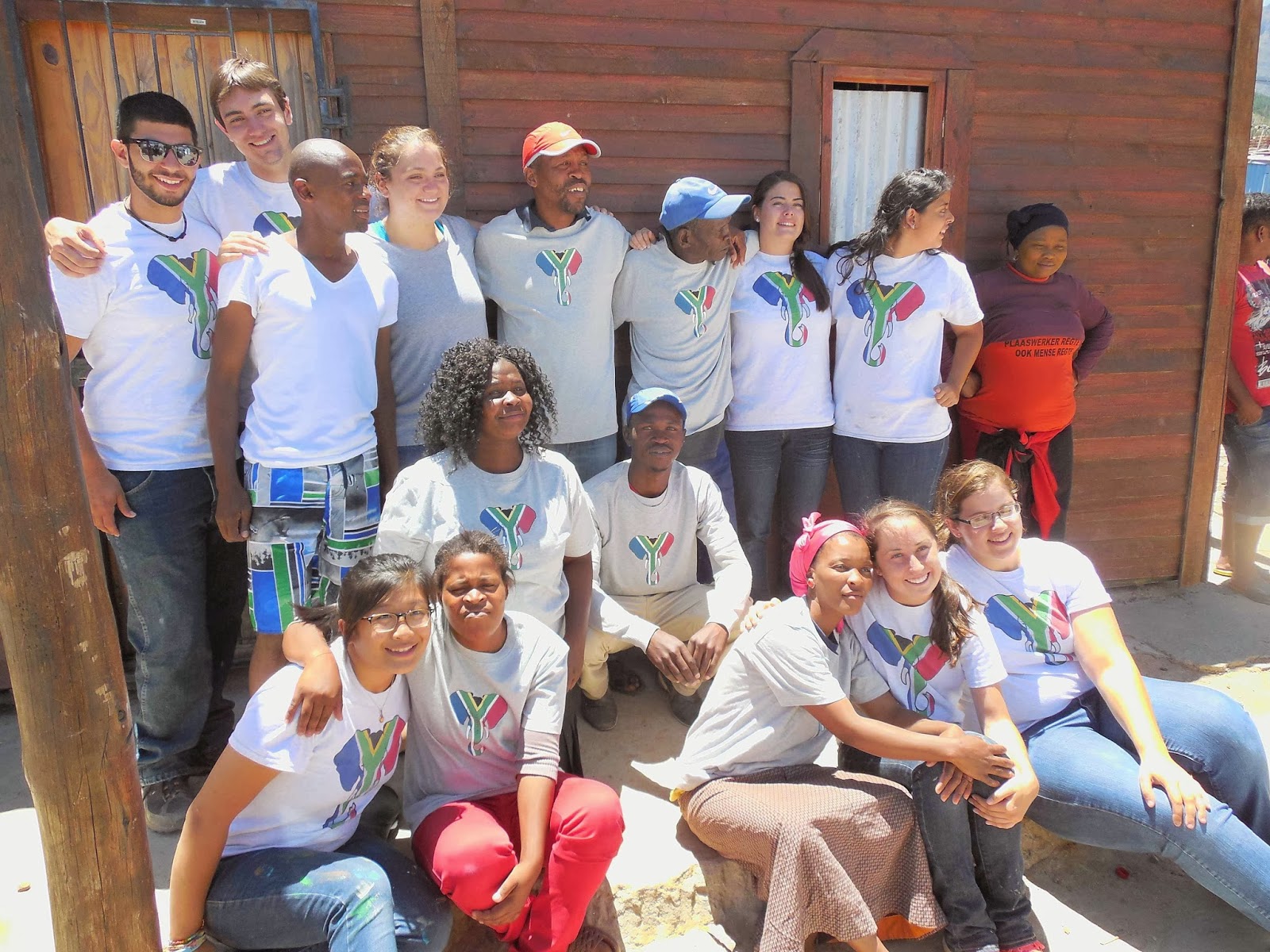First I want to thank everyone who read my
blog, even just once. Knowing that you were reading it made it important
for me to keep up with it as well as I did. And now that it's over, I am
glad I have these entries to look back upon in years to come. I hope you
have enjoyed taking this impossible journey with me, as my feet guided me
hesitantly through the airport, up and down mountains, through grey water
channels, and supported me 216 m above death. Speaking of support, thank
you also to everyone who supported me throughout my adventures, financially and
spiritually. I could not have had the amazing experiences I've had
without your well wishes, prayers and money. You are the bungee that
pulls me safely home.
I find it interesting that when people ask me
about South Africa, the things we focus on are the fun trips I took on
weekends. The bungee jump, the safari, the shark cage diving, and of
course the passing of Nelson Mandela. ("Wait, were you around for
that?" Insert joke about sign language or Obama's selfie). All
of that was certainly memorable and enhanced the impossible trip, but that was
not the reason we were there. Those stories barely describe a fraction of
our time in Cape Town. Most of our time was spent visiting the
settlement, as well as writing impossibly long proposals, assessments, and
working on this website late into the night. I had more
"homework" in Cape Town than I have had in any given term at
WPI. There's a reason why this experience counts as 3 WPI classes.
What motivates us to work so hard is what makes this project centre different
than most. Grades were the last thing on our minds. We had an
impossible job to do. And more than that, our job was to bring sanitation
services to people living without that basic human right. Our customers
weren't the government or a corporate sponsor; they were community members who
knew more about their problems and opportunities than we did. Our
advisor's kept crazier hours than us, willing to edit our work at any hour of
the night to achieve the impossible. Their clear passion for these
projects was infectious.
So was the passion of the people that we worked
with in Cape Town. For them, this work was more than a job or even a
school project. I am inspired by people like Sizwe and Olwethu, who
sacrificed vacation time with their families to work with us. People like
David, Trevor, Alfred, and Nobathembu, who devote their lives to improving
their community. Working with them was a humbling experience. What
we experienced as a fun, educational project is their lives. As I write
this from my apartment with 2 bathrooms for 4 people, I think about them
starting their days soon with the nearest toilet facility a short hike away,
and shared with many.
Perhaps it is a testament to the culture that I
grew up in, but I really do not understand racism, less so after this
trip. When we were in Langrug I did not notice that we were the only
white people there until a group of squealing children pointed it out. I
look at the people we worked with, every one of whom has my sincere respect and
admiration for their talents and contributions. How could anyone look at
them and consider them inferior? How did the beautiful land of South
Africa, (and America for that matter) ever get divided over race? When it
comes down to it we are all just human. We are shaped the same, feel the
same, and move the same (as evidenced by our sweet dance moves on our last day
in Langrug).
It's impossible to describe the beauty of
Langrug to those who have not seen it for themselves. It’s at shocking
sight at first for one has never been to an informal settlement. Yet I see hope
in the settlement, and the resilience of the human spirit. With very limited resources, the people in
Langrug put roofs over their heads and created homes and communities from the
impossible.
It was very strange for me to come home. It seemed like one minute I was on top of
Signal Hill, watching the sunrise over Cape Town, and the next I was impossibly
home at Christmas with my family as if nothing had changed. As if I had not changed. But I have.
I cannot look at a toilet the same way again. A fixture so common and
mundane in my everyday life, but so important for healthy survival, so valuable
where there are none. I sometimes feel like a part of me is still in Africa, in
the work we left behind, in the bonds we made, and in the places we
travelled. It’s strange to think that I
will probably never see my new friends again, or view with my own eyes the
fruit of our work. I’ve caught the “travel
bug”, yet no travelling experience can rival the experience I received in Cape
Town. I am jealous of those who have
just found out that they will be going to Cape Town next year, with no idea
what will be facing them. They are going
to a beautiful city, perhaps the most beautiful in the world. The have only
impossibilities ahead of them. They are
in for long nights, heartache, homesickness, self-reflection, frustration, and
8 weeks I would repeat again if I could.
Because they will also find friendships, hope, adventure, and love on
their impossible journey. For in the
words of Nelson Mandela, “It always seems impossible until it’s done.”








